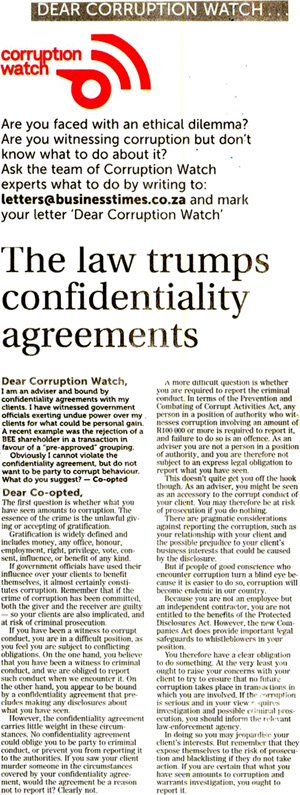|
Getting your Trinity Audio player ready...
|

Are you faced with an ethical dilemma? Are you witnessing corruption but don’t know what to do about it? Ask the team of Corruption Watch experts what to do by writing to: letters@businesstimes.co.za and mark your letter ‘Dear Corruption Watch’.
Dear Corruption Watch, I am an adviser and bound by confidentiality agreements with my clients. I have witnessed government officials exerting undue power over my clients for what could be personal gain. A recent example was the rejection of a BEE shareholder in a transaction in favour of a “pre-approved” grouping.
Obviously I cannot violate the confidentiality agreement, but do not want to be party to corrupt behaviour. What do you suggest? – Co-opted
Dear Co-opted,
The first question is whether what you have seen amounts to corruption. The essence of the crime is the unlawful giving or accepting of gratification.
Gratification is widely defined and includes money, any office, honour, employment, right, privilege, vote, consent, influence, or benefit of any kind. If government officials have used their influence over your clients to benefit themselves, it almost certainly constitutes corruption.
Remember that if the crime of corruption has been committed, both the giver and the receiver are guilty – so your clients are also implicated, and at risk of criminal prosecution.
If you have been a witness to corrupt conduct, you are in a difficult position, as you feel you are subject to conflicting obligations. On the one hand, you believe that you have been a witness to criminal conduct, and we are obliged to report such conduct when we encounter it. On the other hand, you appear to be bound by a confidentiality agreement that precludes making any disclosures about what you have seen.
However, the confidentiality agreement carries little weight in these circumstances. No confidentiality agreement could oblige you to be party to criminal conduct, or prevent you from reporting it to the authorities. If you saw your client murder someone in the circumstances covered by your confidentiality agreement, would the agreement be a reason not to report it? Clearly not.
A more difficult question is whether you are required to report the criminal conduct. In terms of the Prevention and Combating of Corrupt Activities Act, any person in a position of authority who witnesses corruption involving an amount of R100 000 or more is required to report it, and failure to do so is an offence. As an adviser you are not a person in a position of authority, and you are therefore not subject to an express legal obligation to report what you have seen.
This doesn’t quite get you off the hook though. As an adviser, you might be seen as an accessory to the corrupt conduct of your client. You may therefore be at risk of prosecution if you do nothing.
There are pragmatic considerations against reporting the corruption, such as your relationship with your client and the possible prejudice to your client’s business interests that could be caused by the disclosure. But if people of good conscience who encounter corruption turn a blind eye because it is easier to do so, corruption will become endemic in our country.
Because you are not an employee but an independent contractor, you are not entitled to the benefits of the Protected Disclosures Act. However, the new Companies Act does provide important legal safeguards to whistleblowers in your position.
You therefore have a clear obligation to do something. At the very least you ought to raise your concerns with your client to try to ensure that no future corruption takes place in transactions in which you are involved. If the corruption is serious and in your view requires investigation and possible criminal prosecution, you should inform the relevant law-enforcement agency.
In doing so you may jeopardise your client’s interests. But remember that they expose themselves to the risk of prosecution and blacklisting if they do not take action. If you are certain that what you have seen amounts to corruption and warrants investigation, you ought to report it.
Take a stand and report an incident of corruption. This article originally appeared in the Sunday Times Business Times on 29 January 2012.




